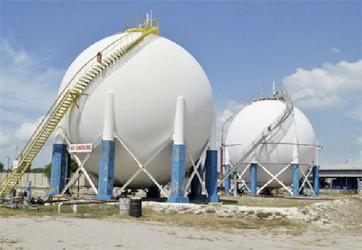(Jamaica Gleaner) The dramatic fall in world crude prices has curtailed Jamaica’s oil bill, but it also means that oil refinery Petrojam Limited has to pay a larger portion of the bill in cash.
Under the PetroCaribe arrangement with Venezuela, Jamaica is now paying for 50 per cent of oil imports upfront, up from 40 per cent, said Winston Watson, the group general manager for Petrojam’s parent company, Petroleum Corporation of Jamaica.
Watson confirmed the shift to 50 per cent cash-50 per cent financing even while insisting Monday that “nothing has changed”, but he declined to state the period when the increase took effect.
Petrojam has a 90-day credit facility for up to 23,500 barrels of oil per day with Petroleos de Venezuela SA (PDVSA), which itself is a 49 per cent minority owner of Petrojam through subsidiary PDVCaribe.

The balance of the refinery’s needs are made up from cash purchases on the spot market. Petrojam can process up to 35,000 barrels per day. The price that Jamaica pays for PetroCaribe oil has never been disclosed, but it has some association with world prices. Up to August, Jamaica’s mineral fuels bill had fallen by US$48 million, or 3.3 per cent to about US$1.4 billion, according to Statin’s most current trade data.
The PetroCaribe arrangement requires beneficiaries of the facility to pay for 40 per cent of the oil upfront when the price is above US$100 per barrel; 50 per cent when it falls within a range of US$80 to US$100 per barrel; 60 per cent at US$50 to US$80 per barrel.
On Jamaica’s schedule, full payment kicks in only if oil the oil price falls below US$15 per barrel. The delayed portion of the payment is transferred to the PetroCaribe Development Fund as a long-term loan repayable at one per cent over 25 years, and the loan proceeds are used to fund development projects and budgetary support for the government.
CEO of the PetroCaribe Fund, Dr Wesley Hughes, also confirmed to Wednesday Business that the flows to the fund had fallen by 10 per cent, but said he would need a day to research when they began to decline.
Regarding the impact of the reduced flows on the fund, Hughes said: “We do not know how long this will last. We are doing a budget and it has specific projections. If that changes we will have to change. Less resources means we will have to make adjustments to our plans and programmes.”
Adjust terms
Beneficiary countries are allowed to purchase a total 185,000 barrels of oil per day under the current PetroCaribe terms. But Venezuela is widely expected to adjust the terms of the facility and cut quota supplies following a 40 per cent decline in the price of oil since June.




